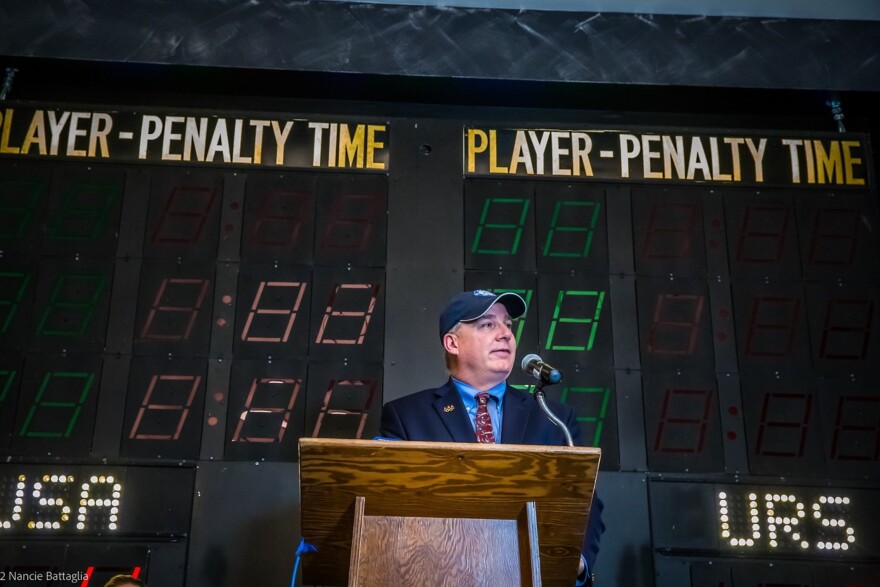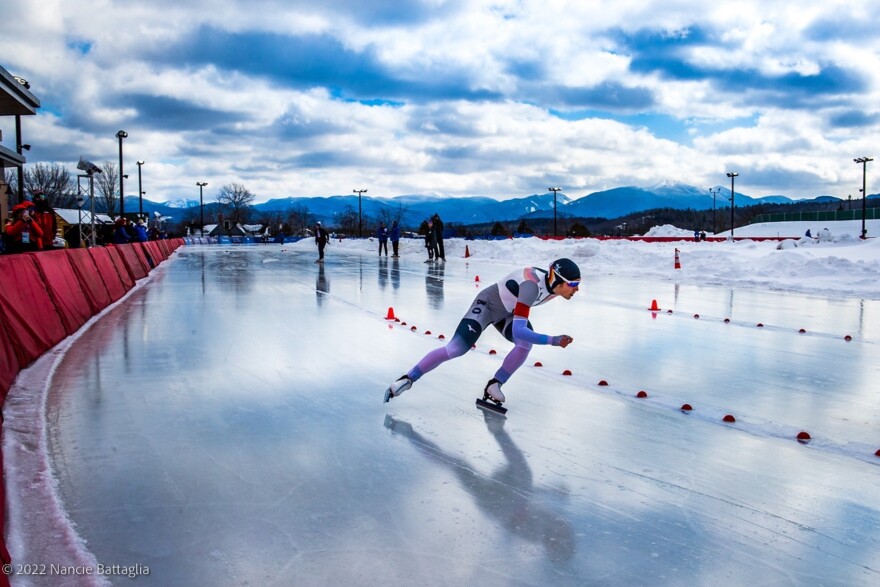Standing in the boardroom of New York's state-run Olympic Regional Development Authority in Lake Placid, CEO Mike Pratt spread out photographs of Olympic sports venues in Beijing, Berlin and Sarajevo that lie abandoned and in ruins.
His message was plain: This almost happened here.
Pratt convinced New York state to bet on a different future, investing huge amounts of taxpayer cash rebuilding and modernizing the sports authority's venues, most dating back to the 1980 Winter Olympics.
"The last six years, the total capital investment in the Olympic authority was $552 million," Pratt said. "These are unprecedented investments in our facilities, no question about it. But the return on investment is immediate."
NPR found New York state has actually pumped far more dollars into the organization since Pratt took the helm, with government documents showing the total outlay closer to $620 million.

The state also spent an additional $46.5 million co-sponsoring the World University Games, a kind of mini-Olympics held in Lake Placid last January; and contributed another $6.5 million to refurbish the main retail street of Lake Placid, a village of roughly 2,300 year-round residents.
The goal, according to state officials, is to boost jobs and tourism. The Olympic authority is one of upstate New York's biggest employers, with roughly 1,500 seasonal and year-round employees.
In addition to operating sport venues, the organization manages a state-funded convention center and three alpine ski areas in the Adirondack and Catskill Mountains.
But with the price tag for revitalizing the authority's venues on track to top $1 billion, some critics question whether Olympic sports and winter tourism are a smart bet for the region's economy.
"When you put half a billion dollars into renovating what they're calling heritage Olympic venues, you're making the investment without having a good part of the investment ever have a chance to pay off," said Andrew Zimbalist, an economist at Smith College who studies public funding for large-scale sports projects.
"We do something special here"
Zimbalist points out in many parts of the world, cities abandon or dismantle competition sites after they host Winter Olympics.
The reason is simple: They're hugely expensive to maintain and often have limited audience appeal. That's especially true in the US, where winter sports like Nordic combined, biathlon and sled racing have never caught on.
"It becomes really problematic to make an economic argument in favor of [maintaining these venues]," said sports economics Andrew Zimbalist. "It's difficult to understand even in the best of circumstances how these investments would pay off over time."
But beginning in 2017, the Olympic authority's Pratt mobilized a group of influential Olympic authority board members to lobby then-Governor Andrew Cuomo.
Their argument was simple: The solution for the Olympic authority's woes wasn't austerity. The solution was a lot more taxpayer cash.
The Cuomo and Hochul administrations agreed and began approving budget requests that now average $100-120 million a year.

According to Pratt, this scale of spending is what the organization needed to finally fulfill its mission as keeper of New York's Olympic heritage.
"We do something special here," he said. "We still host year-round, high-level training and competitions. We put spectators and tourists right next to elite athletes."
Pratt points out Lake Placid's athletic venues once again meet the exacting standards required for international competition, and by the organization's reckoning crowds and revenues are growing.
"Where is everybody?"
Last winter, the Olympic authority hosted the World University Games, featuring hundreds of college athletes from around the world.
It was the biggest sports event in Lake Placid since the 1980 Winter Games and was meant to serve as a coming-out party and a proof of concept for the revitalized organization.

But the 11-day event drew meager crowds. Event organizers acknowledge selling only $706,000 worth of tickets, a tiny amount given the event's half-billion-dollar price tag.
"There were loud voices saying, Where is everybody?" said Marc Galvin, a bookstore owner and Lake Placid village trustee who also heads the Lake Placid Business Association.
"There were expectations out there that people thought it was going to be like the 1980 Games where there were droves of people. We just didn't have the spectators and the fans here."
"Would I have liked to have seen a lot more spectators?" said Olympic authority board president Martens. "Yes. We did not market the games well enough."
After spending massive amounts of money, the Olympic authority wound up receiving almost no revenue from the event.
"You know in hindsight there were a lot of things that could have been done differently and more efficiently," Pratt said.
New York officials say stumbles like this one represent growing pains and aren't reason to doubt New York's vision of Lake Placid as a revitalized world class winter sport destination that will sustain jobs for decades to come.
Betting on winter sports in an era of climate change
But New York's bet on winter sports and tourism faces another big risk — climate change. Upstate New York's winters are already eroding and Olympic authority officials acknowledge they don't know how warmer seasons will affect operations.

"It's a question I can't answer fully," said authority board president Joe Martens. "I just don't know the answer. All the metrics in climate are going in the wrong direction at this point."
The organization already had a taste of what a warmer future might look like. In 2016, Lake Placid received roughly half as much snow as typical. Week after week, rain fell instead of snow. The organization's revenue from ski mountains and tourist venues plummeted.
"We were concerned about [the Olympic authority] not being able to survive," recalled Jim McKenna, head of the Regional Office of Sustainable Tourism, based in Lake Placid.
To keep the organization afloat, and help it make payroll, then-Governor Andrew Cuomo raided millions of dollars from the coffers of the MTA, the state-run transportation authority in New York City that operates subways and buses.
State officials acknowledged the money was needed to "help stabilize the sports authority's finances."
Zimbalist, the economist at Smith University who studies public funding for sports projects, predicted the Olympic authority will continue to need big infusions of taxpayer cash — with or without climate change.
"New York's cost here isn't just half a billion dollars," he said. "The maintenance and updating of these facilities that will go on for decades and decades."
NPR asked the Olympic' authority's Pratt for his estimate how much public money will be necessary to sustain the organization. "It's beyond the scope of what I know," he said. "I think [subsidies] will decrease and level out."
So far, however, the organization's reliance on taxpayers is still growing, not decreasing.
At a board meeting in May, the Olympic authority's board voted to boost its request for state subsidies again — asking New York's legislature for roughly $120 million dollars each year at least through 2027.
-A version of this story first appeared in Adirondack Life magazine.
Copyright 2023 NPR. To see more, visit https://www.npr.org.




